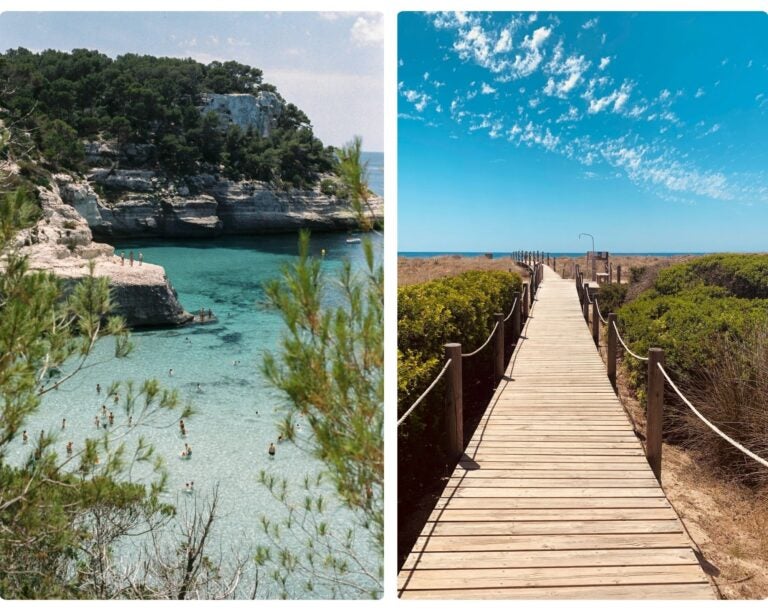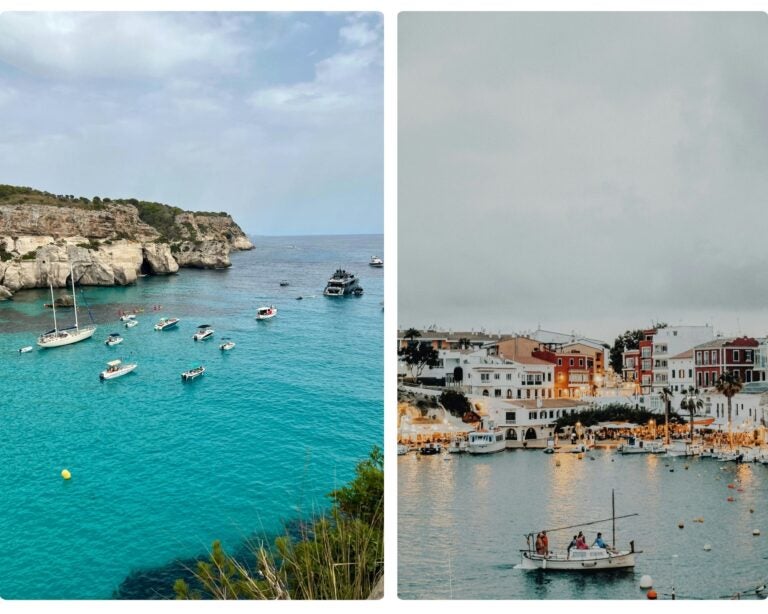Live in Minorca: Learn advantages, disadvantages & costs
Discover what it's like to live in Minorca as a foreigner, including pros, cons and essential tips to make the most of your stay.
Welcome to this guide on what it’s like to live in Minorca, one of Spain’s Balearic Islands most loved for its quality of life and close connection to nature. The island is prized for its stunning Mediterranean views and its laid-back lifestyle. If you’re thinking about spending an extended stay here, we’ll walk you through everything from quality of life and safety for foreigners to the local culture and more.
Minorca, declared a UNESCO Biosphere Reserve, has plenty to offer if you want to experience life like a local for a while. Let’s take a look at its advantages, drawbacks, and some practical tips for making the most of your stay there.
Quality of life in Minorca
To learn about important aspects of the island, we will review key factors that determine its quality of life:
Safety and environment in Minorca
Minorca stands out as one of the safest places in Spain. In fact, it has the lowest crime rate in the Balearic Islands, with just under 47 incidents per 1,000 residents in 2023. To put it in perspective, Mallorca, Ibiza, and Formentera all report noticeably higher figures. This makes Minorca an especially appealing option for solo travelers, families, and retirees looking for a calm and secure environment.
Life in Minorca is relaxed and community-oriented, reflected in how friendly and welcoming the locals are. The culture emphasizes harmony, respect for nature, and strong human connections.
Healthcare system in Minorca
Since Minorca is part of Spain, residents have access to the country’s public healthcare system, which the OECD ranked highly in 2023 for both access and quality. In addition, private clinics in Mahón and Ciutadella provide multilingual medical services, making it much easier for international residents and visitors to feel comfortable.
If you’re coming from outside the European Union, you’ll need to have international health insurance to cover your stay. You can find more details about health insurance for living in Spain here.
Education system in Minorca
Minorca’s education system includes public, private, and semi-private schools, according to the local government. Basic education, which covers primary and compulsory secondary schooling (ESO), is free in public schools. The island also offers options for high school, vocational training, and other specialized programs.
If you’re traveling with children or planning a longer stay, you’ll find both public and private school options. Minorca has bilingual schools teaching in Catalan and Spanish, as well as a few that offer instruction in English. The island’s capital, Mahón, offers the widest variety of educational institutions.
Local economy and employability
Minorca isn’t an economic hub like Barcelona or Madrid, but its local economy relies largely on tourism, hospitality, retail, agriculture, and craftsmanship. There are also opportunities for remote workers, especially in fields like digital marketing, graphic design, programming, and writing.
Average salaries in Minorca are generally lower than on the mainland, but this is balanced by a cost of living that’s lower than on other tourist-heavy islands like Ibiza. According to the 2023 Social Progress Index, Spain ranks among the top 30 countries for overall living conditions, with the island regions playing an important role in that standing.

Internet connection and digital life
Minorca has well-developed digital infrastructure. Major providers like Movistar, Vodafone, and Orange offer 4G coverage, and some areas also have 5G. In urban centers such as Mahón and Ciutadella, internet speeds are fast enough for remote work or streaming content without issues.
In rural areas, coverage may be limited, but there are alternatives like portable routers or eSIM cards. People who work remotely appreciate the peace and quiet of the surroundings and the chance to balance productivity with a better quality of life.
Get connected from day one with Holafly
Arriving in Spain and want to be connected from day one? Holafly’s eSIM provides international coverage without the hassle of a traditional SIM card, perfect for visitors from outside Europe.
And if you’re planning to travel across multiple European countries, we recommend Holafly’s monthly plans. With unlimited internet, you can stay connected wherever you go and share it with your other devices. Perfect for remote work or content creation.
Important: If you are a frequent traveler and want to stay connected without worrying about expensive roaming or looking for a new SIM at every destination, Holafly’s subscription plans are for you. With a single eSIM, enjoy internet in more than 170 countries for a fixed price and no surprises on your bill. Travel without limits and connect easily and securely! 🚀🌍

Advantages of living in Minorca
If you are wondering what the advantages of living in Minorca as a foreigner are, here we will review them:
A peaceful and healthy pace of life
Minorca is famous for its laid-back lifestyle, a world away from city stress. The island promotes balance, with an emphasis on well-being, nature, and strong community ties. In fact, a report from the Minorca Sustainable Development Observatory shows that 70% of residents enjoy low stress and high personal satisfaction.
Plus, with its many hiking trails along the Camí de Cavalls, clean air, and easy access to beaches and natural areas, Minorca makes it easy to live a healthy, active lifestyle.
Protected natural environment
Minorca was designated a UNESCO Biosphere Reserve in 1993, ensuring the protection of its landscapes and biodiversity. This commitment is reflected in local policies that manage development and promote sustainability, keeping overtourism in check. In fact, nearly 40% of the island is legally protected, according to the Minorca Island Council.
For those seeking an ecological, sustainable experience far from mass tourism, Minorca is an excellent choice.
Diverse and welcoming international community
Minorca may not be as international as Mallorca or Barcelona, but its expat community is steadily growing. In 2024, about 15% of the island’s 96,000 residents came from abroad, mainly the UK, Germany, Italy, France, and Argentina.
Cities like Mahón and Ciutadella offer cultural associations, community workshops, and language exchange groups, making it much easier for newcomers to settle in and feel part of the community.
Good balance between cost of living and quality of life
Minorca is pricier than some inland regions of Spain, but living costs are lower than on other Balearic islands. For example, renting a one-bedroom apartment in Mahón averages around $715 per month, compared to over $1,100 in Ibiza, according to Idealista.
Supermarket prices and local transport are also quite reasonable. Combined with the island’s high quality of life, this makes many foreigners see Minorca as offering excellent value for money.
Disadvantages of living in Minorca as a foreigner
Minorca is a wonderful place to live, but it isn’t without its challenges. Here are some of the less favorable aspects to consider if you’re thinking about moving to the island.
Seasonal employment
Much of Minorca’s economy relies on tourism, which means employment is highly seasonal. According to the Balearic Islands Public Employment Service (SOIB), unemployment can rise to 35% in some sectors during the winter months, especially in hospitality and services.
This can make it difficult to find work outside of the tourist season, unless you work remotely or in sectors that are not dependent on tourism.
Limited leisure and cultural activities
Minorca can’t match bigger cities or islands like Mallorca when it comes to cultural offerings. There are museums, local festivals, and theaters, but those seeking a vibrant, cosmopolitan cultural life might find it a bit limited.
Some areas can become very quiet in the off-season. This is great if you value peace and quiet, but it might feel too slow if you prefer a more lively lifestyle.

Difficulty accessing housing
During spring and summer, high tourist demand drives up rental prices and reduces the availability of long-term rentals. According to Fotocasa.es, average rents can increase by as much as 25% between May and September.
There is also little turnover in the long-term rental market, and many properties are used for vacation rentals.
Limited transportation
Minorca doesn’t have trains, and bus service is limited, especially outside the main towns and during winter. If you live in rural areas, you’ll almost entirely rely on your own car.
One downside is that air connections to the mainland and other European cities become limited in the off-season. Many routes to Menorca only operate from April to October.
Frequently asked questions about living in Minorca
In winter, it’s easier to find long-term rentals at more affordable prices. During the high season, however, many owners focus on short-term vacation rentals, which limits what’s available.
EU citizens can access Spain’s healthcare system with a European Health Insurance Card. If you’re not from the EU, having private health insurance is mandatory.
Yes, especially in urban areas with good connectivity. Mahón has coworking spaces, and some villas offer high-speed internet. To stay connected from day one, you can use Holafly’s international eSIM.
On average, monthly expenses can range from $1,210 to $1,540, covering rent, food, transportation, and basic leisure. This can vary depending on the area you live in and your lifestyle.
If you’re coming from Latin America or outside the EU and plan to stay longer than 90 days, you’ll need a temporary residence visa or a digital nomad visa.





 Language
Language 


















 No results found
No results found



